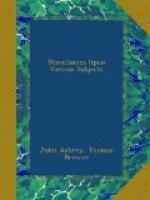**Mr. J. LYDAL of Trinity College, Soc. Oxon. March 11, 1649, 50, attests the ensuing relation, in a letter to Mr. Aubrey, thus,
Mr. Aubrey,
Concerning that which happened at Woodstock, I was told by Mr. William Hawes, (who now lives with Sir William Fleetwood in the park) that the committee which sat in the manor-house for selling the king’s lands, were frighted by strange apparitions; and that the four surveyors which were sent to measure the park, and lodged themselves with some other companions in the manor, were pelted out of their chambers by stones thrown in at the windows; but from what hands the stones came they could not see; that their candles were continually put out, as fast as they lighted them; and that one with his sword drawn to defend a candle, was with his own scabbard in the mean time well cudgelled; so that for the blow, or for fear, he fell sick; and the others were forced to remove, some of them to Sir William Fleetwood’s house, and the rest to some other places. But concerning the cutting of the oak, in particular, I have nothing. Your Friend, To be commanded to my power, John LYDALL.
One Lambert, a gun-smith at Hereford, was at Caermarthen, to mend and put in order the ammunition of that county, before the expedition to Scotland, which was in 1639. He was then a young man, and walking on the sand by the sea side, a man came to him (he did verily believe it was a man) and asked him if he knew Hereford ? yes, quoth he, I am a Hereford man. Do you know it well, quoth the other; perfectly well, quoth Lambert. “That city shall be begirt” (he told me he did not know what the word begirt meant then) “by a foreign nation, that will come and pitch their camp in the Hay wood, and they shall batter such gate,” which they did, (I have forgot the name of it) “and shall go away and not take it.”
The Scots came in 1645, and encamped before Hereford in the Hay-wood, and stormed the —– gate, and raised the siege. Lambert did well remember this discourse, but did not heed it till they came to the Hay-wood. Many of the city had heard of this story, but when the — gate was stormed, Lambert went to all the guards of the town, and encouraged them with more than ordinary confidence: and contrary to all human expectation, when the besieged had no hope of relief, the Scots raised the siege, September 2, 1645, and went back into Scotland, “re infecta”. I knew this Lambert, and took this account from his own mouth; he is a modest poor man, of a very innocent life, lives poor, and cares not to be rich.”




